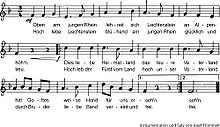„Oben am jungen Rhein“ (nemischa talaffuzi: ˈoːbən am ˈjʊŋən ˈʁaɪn; tarjimasi „Yosh Reyn tepaligida“) — Lixtenshteynning milliy madhiyasi. 1850-yillarda yozilgan bu asar 19-asrda nemis tilida soʻzlashuvchi xalqlarning, jumladan Prussiya, Saksoniya va Shveysariya, Bavariyaning qator madhiyalari uchun ishlatilgan „Xudo qirolni/qirolichani asrasin“ Britaniya madhiyasining ohangiga bastalangan.
 |
 Lixtenshteyn davlat madhiyasi Lixtenshteyn davlat madhiyasi
|
| Soʻz muallif(lar)i |
Jakob Josef Jauch, 1850-yillar |
|---|
| Bastakor |
Nomaʼlum bastakor („Xudo qirolichani asrasin“ kuyidan foydalanadi) |
|---|
| Qabul qilindi |
1870-yil (rasmiy 1920; 1963 yilda tahrirlangan) |
|---|
| Audio |
|---|
|
Lixtenshteyn davlat madhiyasi |
|
"Oberst am jungen Rhein"dan boshlangan asl matn 1850-yillarda yozilgan.
Matn Jakob Josef Jauchga (1802-1859) tegishli[1]. Rossiyada tugʻilgan shveysariyalik katolik dinini qabul qilgan Jauch 1828—1832-yillarda Shveysariyada ilohiyotni oʻrgangan va 1833-yilda katolik ruhoniysi sifatida muqaddas dinga qabul qilingan.
| Nemis tilida
|
Inglizcha tarjima
|
I
Oben am jungen Rhein
Lehnet sich Liechtenstein
An Alpenhöh'n.
𝄆 Dies liebe Heimatland,
Das teure Vaterland
Hat Gottes weise Hand
Für uns erseh'n. 𝄇
II
Wo einst St. Lucien
Frieden nach Rhätien
Hineingebracht
𝄆 Dort an dem Grenzestein
Und längs des jungen Rhein
Steht furchtlos Liechtenstein
Auf Deutschlands Wacht. 𝄇
III
Lieblich zur Sommerzeit
Auf hoher Alpenweid
Schwebt Himmelsruh:
𝄆 Wo frei die Gemse springt,
Kühn sich der Adler schwingt,
Der Senn das Ave singt
Der Heimat zu. 𝄇
IV
Von grünen Felsenhöh'n
Freundlich es ist zu seh'n
Mit einem Blick:
𝄆 Wie des Rhein's Silberband
Säumet das schöne Land,
Ein kleines Vaterland
Von stillem Glück. 𝄇
V
Treu und fest, wenn schon klein
Im deutschen Reichsverein
Ruht Liechtenstein.
𝄆 Lichtvoll auf ew'gem Grund
Einig und kerngesund
In Sturm und Nacht dem Bund
Leuchtstern zu sein. 𝄇
VI
Theilt nicht des Fürsten Herz
Väterlich Freud' und Schmerz
Mit Kindern hier?
𝄆 Nicht ihn erhält das Land —
So reichet ihm die Hand,
In unserm Vaterland
Vater und Zier! 𝄇
VII
Hoch lebe Liechtenstein,
Blühend am jungen Rhein,
Glücklich und treu.
𝄆 Hoch leb' der Fürst vom Land,
Hoch unser Vaterland,
Durch Bruderliebe Band
Vereint und frei. 𝄇
|
I
High on the young Rhine
Lies Liechtenstein, resting
On Alpine heights.
𝄆 This beloved homeland
The dear fatherland
God's wise hand has
Chosen for us. 𝄇
II
Where once St. Lucius
Peace to Raetia
Brought,
𝄆 There by the border stone
And along the young Rhine
Liechtenstein stands fearless
On guard for Germany. 𝄇
III
Lovely in the summer
On the high Alps' meadows
Floats heavenly quietude.
𝄆 Where the chamois leaps freely,
The eagle soars boldly,
The herdsman sings the Ave
For the native land. 𝄇
IV
From green rocky heights
It is lovely to look at
With one gaze:
𝄆 How the Rhine's silver band
Hems the beautiful land
A small fatherland
Of silent bliss. 𝄇
V
Loyal and firm, even if small
In the German Empire association
Rests Liechtenstein.
𝄆 Full of light on eternal ground
United and healthy
In storm and night the union
to be a shining star. 𝄇
VI
Does the prince's heart not share
Fatherly joy and pain
With children here?
𝄆 The country is not receiving him —
So give him your hand
In our fatherland
father and ornament! 𝄇
VII
Long live Liechtenstein,
Blossoming on the young Rhine,—
Fortunate and faithful!
𝄆 Long live the Prince of the Land,
Long live our fatherland,
Through bonds of brotherly love
United and free! 𝄇
|
